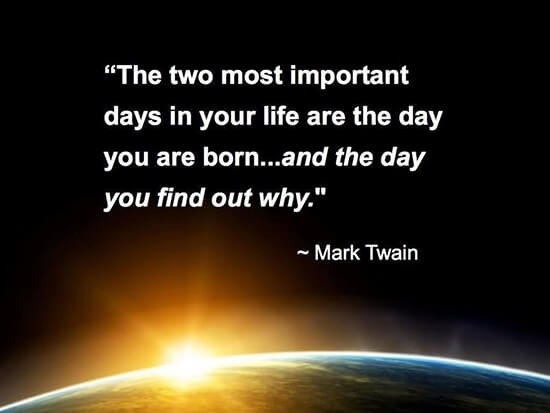The notion of purpose in life at first may seem ill-defined and even unscientific. But that’s not so. Straight away, there is real science. The sense of purpose has been studied extensively and a growing heap of research is pinning down what it is, and how it affects our lives.
Remarkably, people with a greater sense of purpose live longer, sleep better and have better sex. Purpose cuts the risk of stroke and depression. It helps people recover from addiction or manage their glucose levels if they are diabetic. If a pharmaceutical company could bottle such a treatment, it would make billions. But you can find it for yourself, and it’s free.
Purpose dictates not just how we live, but whether we live! Victor Frankl, an Austrian psychiatrist who survived four Nazi concentration camps, including Auschwitz, noticed that some of his fellow prisoners were far more likely to survive than others. “Woe to him who saw no more sense in his life, no aim, no purpose, and therefore, no point in carrying on. He was soon lost,” he later wrote [Man’s Search For Meaning, 1946].
Frankl thought that, just as food and water can nourish and strengthen our bodies, purpose and meaning can nourish and strengthen our minds. He referred to our craving for purpose as the “will to meaning”.

Here’s some actual stats:
In an analysis of 7000 middle-aged people in the US, even small increases in sense of purpose were associated with big drops in the chances of dying during a period of 14 years. A study of more than 9000 English people over 50 years old found that—even after adjusting for things like education, depression, smoking and exercise—those with the highest sense of purpose had a 30 percent lower risk of death over nearly a decade compared than those in the lowest motivated group. Other studies show higher purpose cuts risk of heart disease by 27 percent, stroke by 22 percent and Alzheimer’s disease by half.
Of course, teasing out whether it is actually purpose itself, and not the fact that purposeful people may exercise more or eat better, can be difficult. But over the past 10 years, repeated studies of the health benefits of purpose have been remarkably consistent.
These benefits are still clear, “even after statistically controlling for age, race, gender, education, income, health status and health behaviors”, says Victor Strecher, a public health researcher at the University of Michigan in Ann Arbor and author of the book, Life on Purpose.
So What Is Purpose?
Today, researchers define purpose as a sense of direction in life—a long-term goal set around one’s core values, that makes life worth living, and shapes daily behavior. It is a component of broader measures of what researchers today call long-term subjective well-being or happiness, in which there has been a surge of interest in the past two decades.
Measures of happiness can reflect broader social issues such as inequality, but when researchers look at the individual elements that make up well-being, they find purpose on its own has a unique influence on health.
The only reason purpose isn’t a top public health priority, says Victor Strecher, is because it somehow feels too vague or ephemeral. “It’s not a construct that feels scientific enough,” he says. “If this were a physical issue or a new drug or a gene, you would see lots of funding going into it.”
Some of the scepticism has to do with concerns that purpose is merely a stand-in for opportunity in life, or wealth. But a 2007 Gallup poll of 141,000 people in 132 countries found that, even though people from wealthier countries rate themselves higher on measures of happiness, people from poorer nations tend to view their lives as more meaningful.
Or could it be that purpose is just another term for religious faith? A study by Shigehiro Oishi at the University of Virginia in Charlottesville, did find that nations with the highest ratings of meaning in life were also the most religious. And religious people do tend to report having more purpose. But efforts to disentangle the two have revealed differences. Religiosity doesn’t predict a lower risk of heart attack or stroke, for example. And certainly many non-religious people have high levels of purpose.
Serving Self and Serving Others
So how does that sense of purpose actually improve your health? It could be that a greater sense purpose makes people more conscientious about maintaining their health. But Steven Cole at the University of California, Los Angeles, thinks there’s more to it. He has spent years studying how negative experiences such as loneliness and stress can increase the expression of genes promoting inflammation, which can cause cardiovascular disease, Alzheimer’s or cancer.
In 2013, Cole examined the influence of well-being instead. He focused on two types: hedonic, from pleasure and rewards, and eudaemonic, from having a purpose beyond self-gratification. These are tricky ancient Greek words, so I will switch to:
- Serving only self (hedonic) and
- Serving others (eudaemonic)
These two aspects were measured by having participants note down their well-being over the previous week, how often they felt happy or that their life had a sense of value and direction, for example. Although scoring highly in one often meant scoring highly in the other and both correlated with lower levels of depression, they had opposite effects on gene expression.
People with higher measures of satisfaction from serving only self had higher expression of inflammatory genes and lower expression of genes for disease-fighting antibodies. This is the pattern seen in loneliness and stress! So being happy just for yourself is not so healthy!
On the other hand, for people scoring highest on feeling enriched by serving others, it was the opposite. The real surprise for Cole was that you can feel similarly happy serving only self, or serving others, but the biological states are in such sharp contrast.
This might be the final rebuff to those “Darwinian socialists” like Richard Dawkins, those weird scientists that think altruism is a waste of time and only greedy, grasping aggressors get ahead in the genes race! Maybe not.
Perhaps serving others, the core of any meaningful purpose, decreases the nervous system’s reaction to sudden danger that increases heart rate and breathing and surges of adrenaline. There may be something within, telling us to be less frightened, or less worried, anxious or uncertain.
In Supernoetics® , that “something” is the drive originating from the very core of Being. We teach that our “creature” selves and our spirit lives are very differently motivated. The creature (organism, person, animal) is driven by survival and its principal emotion is fear. It’s is a stressful contest with death.
The spirit (animus), on the other hand, is non-material and therefore cannot die. It’s not worried about survival and its primary emotion is love. You can quickly appreciate that ascending to the non-material spirit plane shields us from killer biology and its stressful “flight-or-fight” responses.
That’s why meditation has been shown to have measurable biological benefits, though there are an increasing number of negatives about meditation that are coming to light.
Best of all, get yourself Supernoetics® piloting! You can encounter purpose first in the levels to do with The Quality of Life. Then, you meet it again in a far more profound and impactful level: our Failed Purposes and Lost Universes exploration.
I also make a big point about it in planning and endeavor. Most ”gurus” teach the greedy, grabbing hedonistic or self-serving happiness… figure out what you want and then strive to get it.
However, I place PURPOSE right at the top of all plans and motivations. What is it you really want to DO, with plenty of reasons why, stated or implicit? The idea that an individual can be motivated to do anything in pursuit of fast cars, gold, luxury yachts or a massive house is nonsense. These worldly GOALS just do not work out.

The post Purpose in Life Adds Years Maybe Decades To Your Lifespan appeared first on Dr. Keith Scott-Mumby.
